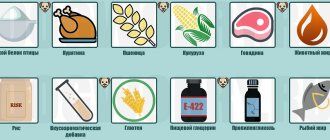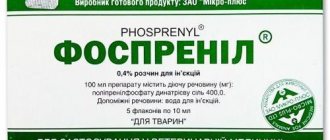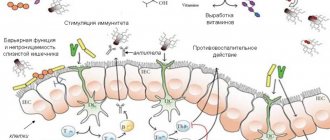Gastrointestinal diseases in dogs are common. They can be caused by infections, parasites, tumors, swelling and obstructions. Gastrointestinal health is very important to the overall health of dogs. When the gastrointestinal microflora is disrupted or digestive problems arise, this can cause many other diseases. Therefore, it is important for dogs to eat biologically appropriate food.
How does the gastrointestinal tract of dogs work?
When a dog swallows food, it enters the small intestine. In the small intestine, food is digested, the body absorbs nutrients, which are carried throughout the body through the blood. Excess water is absorbed in the large intestine. Undigested parts of food are eliminated from the body.
Various enzymes help the intestines digest food. These are proteins that break down large molecules into smaller parts. For example, lipase helps convert fats and oils into fatty acids. Proteases help break down proteins into amino acids. Vitamins and minerals are already small enough that they do not need to be broken down further.
Dogs' bodies cannot digest fiber. Fiber is needed for transit function: it stimulates the intestines and helps the body push food through the digestive system.
There are a lot of bacteria in the gastrointestinal tract of dogs. Some of them help break down food, others help produce vitamins, and others are needed to fight harmful bacteria.
Healthy intestinal microflora is the key to normal digestion, strong immunity and healthy dogs.
The structure of the gastrointestinal tract of dogs
How do gastrointestinal diseases occur in dogs?
Gastrointestinal diseases in dogs often occur due to disturbances in the intestinal microflora. Few people think about this, so an imbalance of intestinal microflora remains one of the unobvious causes of digestive problems.
The beneficial bacteria that live in dogs' intestines do not live forever. Dead bacteria must be replaced by new ones. They enter the body with food. If beneficial bacteria do not enter the body, the colonies in the intestines gradually decrease, which leads to an imbalance of the intestinal microflora. There are more harmful bacteria than beneficial ones, problems with digestion and more arise.
If dog food is processed at high temperatures, not only harmful microbes are killed, but also beneficial bacteria. When you feed your pet industrial food, new beneficial bacteria do not enter its body.
Scientists have conducted several studies in which they compared the microflora of dogs that eat species-typical and industrial food. Research results have shown that on a biologically appropriate diet, the stomach microflora is richer and there are more beneficial bacteria than in dogs that eat commercial food.
Stomach bacteria protect the lining of the small intestine. Thanks to this, nutrients are absorbed gradually, and harmful microorganisms do not enter the blood. When the microflora of the stomach is disturbed, pathogenic bacteria easily penetrate the blood and affect not only the stomach, but also other organs. Dogs appear
- allergies,
- intestinal inflammation,
- constipation,
- diarrhea,
- disorders of the liver,
- diabetes,
- renal failure, etc.
If your pet is allergic to any food, it may be due to an imbalance in the intestinal microflora. In this case, you need to restore healthy microflora, and a species-typical diet will help with this.
When the intestinal microflora is disturbed, the walls of the small intestine become loose. Because of this, it is easy for pathogenic bacteria to penetrate into the blood
Diseases of the digestive system in dogs
Diseases of the digestive system in dogs are extremely common.
The digestive tract can be divided into two segments. The first is the digestive tube, consisting of the esophagus, stomach, small and large intestines, where food is digested and nutrients are absorbed into the blood. The second is the wall glands: liver and pancreas, which secrete digestive juice into the intestinal lumen.
What gastrointestinal diseases occur in dogs?
Gastritis is inflammation of the gastric mucosa. Enteritis is inflammation of the small intestine. Pancreatitis is inflammation of the pancreas tissue. Hepatitis is an inflammation of the liver tissue.
The disease can be localized in one organ (for example, gastritis), but more often affects several organs at the same time (gastroenterocolitis).
What are the causes of these diseases?
The reasons are very varied. Provocations include violation of the diet, feeding too cold or hot, fatty food, overeating, exposure to chemical irritants, poisons. An important role in the development of diseases of the gastrointestinal tract (GIT) is played by viral and bacterial infections (canine distemper, viral enteritis, adenoviral infections, leptospirosis, etc.), protozoa and helminths, intolerance to food components, as well as neoplasms (tumors). The habit of gnawing and sometimes swallowing inedible objects can cause mechanical injury or blockage of the digestive tube.
You should also be aware of functional disorders, such as acute dilatation and volvulus of the stomach - an acute condition requiring emergency (within 3-5 hours) specialized care.
Gastrointestinal obstruction is one of the most dangerous conditions. Such pathologies can cause death of gastrointestinal tissue within a few hours, up to the development of peritonitis and death of the animal. No less dangerous are viral agents that cause complex damage to the gastrointestinal tract.
What are the symptoms of gastrointestinal damage:
- food refusal
- oppression
- vomiting or unproductive urge to vomit
- bloating or so-called “boiling”
- diarrhea or constipation
- restlessness, abdominal pain
- change in the consistency and appearance of stool
- with a long course - loss of body weight and exhaustion
- in some cases - fever
How is diagnosis carried out?
To determine the causes of a gastrointestinal disorder, its localization in the organ system and the identification of concomitant diseases, blood tests, stool tests, radiography, ultrasound, and tests for viral diseases may be required.
In each individual case, the veterinarian decides which diagnostic measures and in what sequence need to be carried out to identify the cause of the disease, the nature of the lesion and the choice of treatment tactics.
How to treat?
It is important to eliminate the cause of the disease. In the acute form or long-term course of the disease, complex treatment is required, including infusion therapy, the use of antiemetics, antidiarrheals, painkillers, and antibacterial agents. For intestinal foreign bodies, gastric volvulus, and in some cases for neoplasms, the first stage of treatment is surgical intervention. In case of a viral cause of the disease, specific serums are used; in the presence of parasites or protozoa in the gastrointestinal tract, appropriate drugs are used. During the rehabilitation period, a special diet is required.
In some cases, an acute disease can become chronic. Such conditions require long-term targeted treatment using a strict diet.
How to avoid gastrointestinal diseases?
timely vaccination and deworming, proper feeding help prevent the disease. The correct selection of treats and toys is important (the dog should not be able to swallow the whole toy or chew off part of it), it is necessary to exclude all kinds of sharp objects and bones (especially bird bones). With the help of training, you can wean your dog from picking up dangerous objects while walking.
Common gastrointestinal diseases in dogs
An imbalance of intestinal microflora is not the only cause of digestive problems. Illnesses can be caused by parasites, infections, poisoning, etc.
The main symptoms for various gastrointestinal diseases in dogs are similar:
- increased salivation,
- diarrhea,
- constipation,
- vomit,
- loss of appetite,
- bloating,
- problems with bowel movements.
Inflammation of the large intestine
Symptoms: it is difficult for the dog to defecate, the stool is liquid, there is blood in it, the dog more often asks to go outside.
A pet with such symptoms should definitely be taken to the veterinarian. He will determine the cause and prescribe treatment. One treatment option is to review your dog's diet and add fiber to the diet.
Constipation
Symptoms: it is difficult for the dog to go to the litter box, the feces are very dry and hard. Some dogs lose their appetite and vomit.
Constipation is often caused by a lack of fluid in a dog's diet. Sometimes constipation is due to physical causes, such as enlarged lymph nodes or tumors. To rule out these causes, you need to show your dog to a veterinarian.
Drinking plenty of fluids will help with constipation. The doctor may prescribe mild laxatives or recommend increasing the amount of fiber in your pet's diet.
Intestinal inflammation
Symptoms: vomiting, pain in the stomach.
The cause of inflammation can be an imbalance of the gastric microflora, poisoning, or injury.
To determine the cause, the dog must be examined by a doctor. He will prescribe the appropriate treatment.
Intestinal malabsorption syndrome
With this syndrome, the dog's intestines do not absorb nutrients well. This is caused by a lack of certain enzymes in the body.
Symptoms: weight loss, regular diarrhea, increased or decreased appetite. Sometimes the syndrome causes virtually no symptoms and may remain unobvious for a long time.
Diagnosing intestinal malabsorption syndrome is difficult because the symptoms of the syndrome are similar to those of other gastrointestinal diseases. In the case of the syndrome, a change in diet is one of the prerequisites for recovery.
Why might a pet need emergency veterinary care due to gastrointestinal diseases?
Gastrointestinal ailments in pets can develop for various reasons, the most common of which are the following:
1) If pregnancy proceeded in non-ideal conditions (there were deficiencies in exercise, adequate nutrition, animal care), then insufficiently healthy conditions of intrauterine development may cause problems with the gastrointestinal tract in her litter; 2) In kittens and puppies, gastroenteritis, gastritis and other gastrointestinal diseases can develop as a result of a sharp transition to self-feeding from mother’s milk; 3) Animals often get sick because they are fed food that is unusual for them or of insufficient quality: canned food, sweets, cheese, stale dairy products, spoiled fish or meat; 4) Gastritis in a four-legged friend can even be caused by drinking dirty water; 5) Inflammation of the gastrointestinal tract can be caused by eating food with inedible mechanical impurities, such as paper, sawdust, soil, sand, glass, etc.; 6) Pets need a thoughtful diet and careful attention to what is given to them for food. Therefore, even too cold food and water, which some owners give their pets directly from the refrigerator, can cause gastrointestinal ailments in them.
How does a species-typical diet help with gastrointestinal diseases?
Biologically appropriate dog food includes raw meats, organ meats and vegetables. These are the main components of a healthy diet. Dogs' bodies are designed to obtain essential nutrients and energy from animal protein. It is easily digestible and does not burden the kidneys, liver and other organs. A healthy diet should include enough fluids to avoid constipation and dehydration.
As already mentioned, gastrointestinal diseases in dogs are often caused by a violation of the gastric microflora. A varied species-typical diet helps keep the microflora healthy. A healthy stomach environment provides protection from harmful bacteria and parasites, strong immunity and normal functioning of all other organs.
A healthy diet will not only help solve digestive problems, but also prevent gastrointestinal diseases in dogs. Providing such nutrition is easy: try SUPERPET. Contains only natural ingredients. The food is stored and delivered frozen, so you can be sure that there are no preservatives in it. Help your pet eat right - this will keep him healthy and ensure a long and happy life.
Did you like the article? Share with your friends:
Stomach cancer
Unlike humans, these pathologies are extremely rare in domestic animals. Veterinarians report that male dogs are most susceptible to them. As for certain breeds, boxers, German shepherds, poodles, Great Danes and many spaniels are at risk. There is still no precise and unified understanding of the reasons for the development of neoplasms. Unfortunately, at least 70% of stomach tumors in dogs are malignant in nature.











